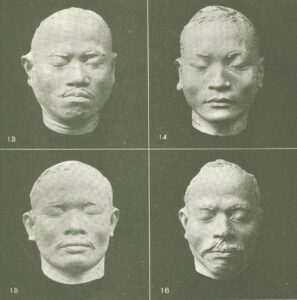This year’s first colloquium has been organized by Fenneke Sysling (Leiden University) and will be held from 18 till 20 October. You are welcome to attend the public lecture Densità e opacità degli oggetti sensibili. Prospettive nella curatela delle collezioni coloniali by Rosa Anna Di Lella (Museo delle Civilità di Roma) on Tuesday 19 October at 17.00 CET at the institute.
Deel deze pagina Central to this KNIR colloquium are collections of plaster face casts, found in anthropological museums all over Europe. Plaster face casts were made by anthropologists who created moulds by applying plaster to the faces of non-western people, brought the moulds to Europe and poured fresh plaster into it to create copies of the original faces. These casts were used to study and display racial differences and were often made of colonial subjects.
Central to this KNIR colloquium are collections of plaster face casts, found in anthropological museums all over Europe. Plaster face casts were made by anthropologists who created moulds by applying plaster to the faces of non-western people, brought the moulds to Europe and poured fresh plaster into it to create copies of the original faces. These casts were used to study and display racial differences and were often made of colonial subjects.
Plaster face casts are odd objects in museums. Unlike many other colonial objects, they are not unique. That is: from the moulds, several copies were often made and exchanged. Also, while they were made as scientific artefacts that were supposed to convey the essence of racial groups, people have always been struck by their individuality, lifelikeness and beauty. Many museum visitors today on the other hand see these objects as a forceful reminder of the violence of colonialism and its impact on individual lives that can be seen in the anxious faces.
What do we know about the past of these casts and how do we deal with them ethically today? This colloquium brings together (paleo)anthropologists, historians and curators to discuss these questions from the viewpoints of different disciplines.
Historical questions that inform our discussions are: What do we know of the experience of those people whose faces were cast? What were the aims and ideas of the anthropologists who made the casts? Why were some plaster casts painted in skin colour while others were not? How were they received by visitors? How were the casts displayed over time?
We also discuss current and future practices: Can these casts be replaced by copies (if the moulds still exist) or is there some value in the originals? What do the descendants of colonized people think of these practices and the presence of the masks in Europe? Is it possible to take ‘race’ out of the masks? Should these collections be ‘decolonized’ and how? With this colloquium, we bring together a diverse set of researchers to discuss historical contexts and current challenges. We aim at laying down a framework for a future publication that draws attention to the important role of these casts.
YOU ARE WELCOME TO ATTEND THE PUBLIC LECTURE
Densità e opacità degli oggetti sensibili. Prospettive nella curatela delle collezioni coloniali
by Rosa Anna Di Lella (Museo delle Civilità di Roma)
on Tuesday 19 October at 17.00 CET at the institute.*
*Please be aware that only a limited number of places is available and that a green pass is required. We kindly ask you to register by sending an email to secretary@knir.it